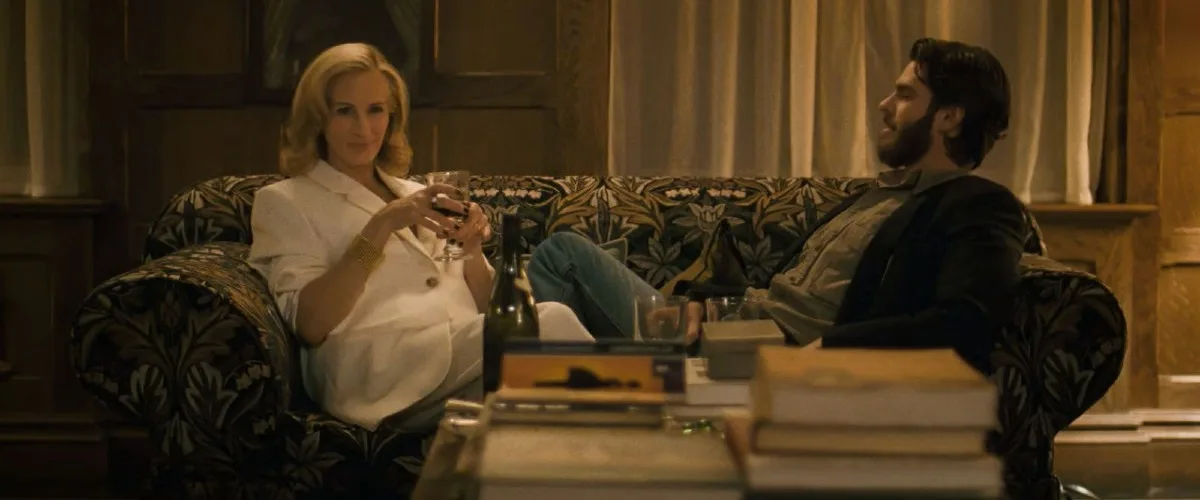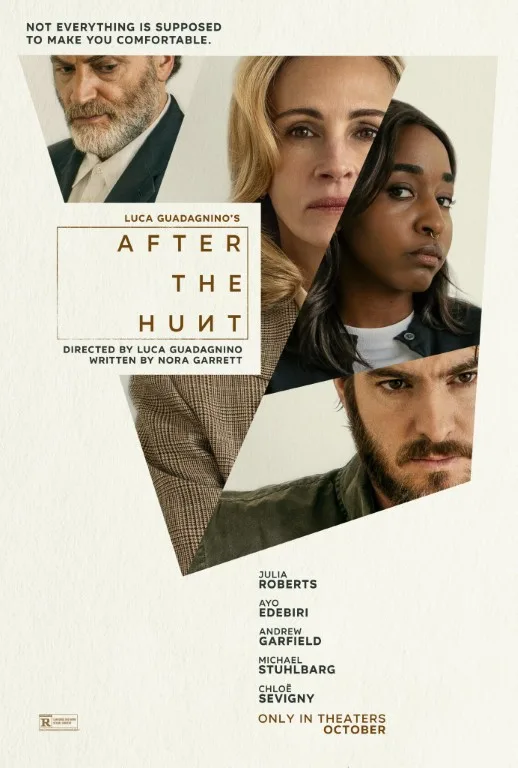“Cancel culture” is a minefield. And those who claim that it exists seem to define it in one way only: being erased from public and professional life without due process or any hope for a comeback. Even though many of those who lost their status (or got “cancelled”) in recent years have merely faced the consequences of their proven actions, the originators of the saying managed to pull a great trick: these days, we are all using the term unironically somehow (whether we agree with cancel culture’s existence or not), and thus, inadvertently doing the bidding for the narrative.
Why is this intro into the murkiness of “cancel culture” necessary in order to talk about Luca Guadagnino’s sharp and well-calibrated campus psychodrama “After the Hunt,” you might rightfully ask. That’s because—at least at first glance—those are the treacherous waters that Guadagnino and first-time screenwriter Nora Garrett set out to navigate. Has the “consequence culture” (a more accurate name for our current moment) gone too far? Are we being a tad unfair? And yet, these questions only scratch the tip of the iceberg in Guadagnino’s handsomely provocative thriller, about a modern-day (and fictional) sexual assault case in the mahogany-heavy bowels of an Ivy League school.
Beyond that façade, there is thankfully more—a great deal more. What “After the Hunt” really pursues over the course of its patient two-hours-and-change is something several levels deeper, akin to John Patrick Shanley’s pre-#MeToo masterpiece, “Doubt.” First a stage-play in 2004, then a searing 2008 movie that pits two greats—Meryl Streep and Philip Seymour Hoffman—against each other in a Catholic Church sexual abuse scandal, “Doubt” was about the eponymous concept that goes hand-in-hand with faith, like the other side of the same coin. Human beings are complex; everyone holds multiple truths with competing motivations and priorities, and you can’t really reach the truth by simply asserting your certainty.
Those ideas that favor healthy skepticism over blind faith are very much at the heart of “After the Hunt” as well, as Garrett’s thoughtful (if imperfect) script reveals the depths of its trio of main characters in drips. But unlike in “Doubt,” the question of whether or not the aforementioned assault happened takes a backseat in due course. Again, this film primarily explores individual and social complexities, as well as how the truth can be interpreted and misinterpreted through the eyes of the pursuer.
Here, the primary player is Julia Roberts’ Alma Imhoff, a Yale philosophy professor on the cusp of receiving her well-earned tenure. The film kicks off with Alma’s morning routine, set against the backdrop of muffled sounds and Trent Reznor and Atticus Ross’ ticktock-ing score, which feels like a bomb is about to detonate. We meet the other players soon enough—there is Ayo Edebiri’s PhD candidate Maggie Price, an evident protégé of Alma—and Andrew Garfield’s loose-limbed Hank Gibson, Alma’s close department friend. And if their suggestive closeness is any indication, they have occasionally been a bit more than friends.
That well-teased bomb goes off after an ultra-chic yet cozy party at the home of Alma and her psychiatrist husband, Frederik (Michael Stuhlbarg), where both Hank and Maggie are among the guests. Being a filmmaker of details that sing to the five senses, Guadagnino takes his time to romanticize this academic environment occupied by the intelligentsia—the books, the heaps of art and valuables, the perfectly imperfect historical smell of the sophisticated home, the warm embrace of golden-lit interiors… They all set the stage for the intellectual chit-chat that unfolds, and some facts that rise to the surface. Maggie, a gay woman in a relationship with a non-binary partner, is infatuated by Alma and is a bit too comfortable peeking into private cabinets that she shouldn’t open. The observant Alma, on the other hand, is gifted at wielding her undeniable charms and powers. And Hank can afford to reduce his boozing and to be considerably less handsy.
It is on the heels of this environment that a shivering Maggie shows up at Alma’s doorstep in tears, with the accusation that Hank has assaulted her. After Alma’s meeting with the Dean (a testimony we don’t quite witness), Hank loses his job and prospects, leaving Alma increasingly rattled. On the one hand, there is his desperate friend going off the deep end (Garfield is terrific exploring this new territory as an actor) and insisting upon his innocence. On the other hand, there is the optics of doing the right thing that might affect her tenure.
Without spoiling its surprises, Garrett’s script is smart to follow in the footsteps of classic thrillers and embellish each character (not just Hank, but the women too) with details that point to their own unreliability as narrators. In Maggie’s case, she might not be the ace student we assumed her to be. And in Alma’s case, well … she comes with a substance abuse problem, and a past episode that might have contributed to her biases. Guadagnino times these plot turns perfectly, blurring every picture we once took for granted as truth. “After the Hunt” exposes a fascinating battle of generations between Alma and Maggie as these knotty maneuvers settle. The former had to work for every right that she has, often in notoriously male-dominated environments. And the latter is of a different mindset that Alma detests (and perhaps envies as well). To Alma, Maggie and her Gen-Z counterparts walked into the comforts of their time through the work of older women like herself. In one scene (that was admittedly satisfying to this Gen Xer but might understandably send Gen Z to a permanent state of cringe), Alma asserts that not everything in the world is supposed to be comfortable, like a warm bath. Sometimes, we should be made uncomfortable. And that is, in the end, what “After the Hunt” attempts and mostly succeeds in.
It would have been nice to have seen a deeper exploration of Maggie, a character who is Black, gay, and extremely wealthy. There is something fascinatingly rich yet underexplored at that intersection that movies don’t often represent, and “After the Hunt” engages with it only on a surface level. Another questionable decision arrives right at the start, when an unmistakably Woody-Allen-opening-credits font (accompanied by a familiarly Allenesque jazzy tune) appears. The movie that follows is successful enough in establishing its own terms regarding morality, identity politics, “cancel culture” (there is that dreaded phrase again), gender, and generational gaps. Why muddy those waters by what appears to be a wink to a real-life case of a man who fell from grace?
But even if that little misfortune gets you to be cautious early on, stick with the film and its many rewards. Among them is a truly breathtaking Roberts, who—in a sleek Lauren Bacall do and Giulia Piersanti’s enviably academia-chic wardrobe of classic suits and lux cashmeres—gives a brand-new purpose to her dearly missed piercing gaze, incomparable laugh, and angular features as the ever-multifaceted Alma. Another reward is the movie’s clear-eyed reckoning with a time when most people lost the ability to hold multiple truths simultaneously. In that, “After the Hunt,” with a brilliant epilogue, isn’t quite about whether Hank is guilty, or about challenging or discrediting all the good that the #MeToo movement has achieved so far. Instead, it’s a movie that pushes us to be better, deeper thinkers and assessors. After all, an evolving movement as momentous and consequential as #MeToo should demand nothing less.
This review was filed from the U.S. premiere at the New York Film Festival on September 26. It opens on October 17.




















